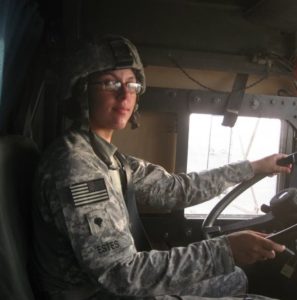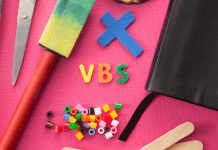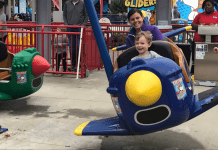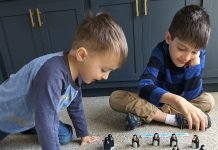
My son was 11 months old in when my army reserve unit was given its mobilization orders to be part of Operation Iraqi Freedom. Before this point, being in the army had meant one weekend a month and two weeks in the summer of training; not taking up a lot of time, it was mostly forgotten throughout my daily life. Now it was suddenly the gut-wrenching focus. Trying to emotionally prepare myself to leave my baby was harder than I ever thought it would be. My then-husband couldn’t handle anything by himself so his mother arranged to live with him to take care of everything while I was gone.
After training, we were allowed visits home. Each visit was after more and more time away; first two weeks at my unit, then four weeks in Ft. Riley, then six weeks in Camp Atterbury, IN. I tried to tell myself time away was a good thing, that it would help my family adjust to being without me. I was hoping it would be easier for me to transition as well, but every visit home I noticed my son wanting less and less to do with me. It broke my heart to leave again, but I had no choice. A decision I made two years before my son was born was showing its long-reaching consequences.
After a 16 hour flight, we landed “boots on ground” in Camp Arifjan, Kuwait on July 7. The heartache was indescribable. I was a childless mother over 7,000 miles and eight time zones away from my baby boy. What made the separation harder was the fact that he was too young to understand where I was or why. At only 17 months old, all he knew was that I was gone. Having to put my trust in my mother-in-law to care for my son, I had to put him out of my mind. I found that focusing on the task at hand helped to stave off my grief. It might sound heartless, but I had to in order to be a functioning soldier.
I was only able to message home about two or three times a week if we had camped in a good spot out on mission. If not, then I might not be able to reach home for a week or more at a time. Making this already-tough situation into hell on earth, was having zero support from my then-husband. When video messaging home, if I asked to see my son “too soon” in the conversation or if he didn’t think I was “missing him enough” he wouldn’t put my son on to see me. The whole time I was deployed, he only sent three, mostly blurry, pictures of my baby to me.
In mid-October 2008, I was given a two-week leave to fly home. It had only been four months since I last saw my son, he was already acting like he didn’t know me.
I was back in the desert much too soon and finding myself unhappy with my spouse, I threw myself into my work. With eight months left in the deployment, I cleared my slate. This would be the longest haul yet without being with my baby and not being able to see him unless I passed an emotionally abusive test was too much for me to bear, so I cut him off. I distanced myself so completely that I sometimes forgot that I had a small child at home. It helped me to survive.
Coming home for good was hard. After eight months of being “single” and suddenly finding myself trapped in a bad marriage with a two-and-a-half-year old that didn’t know me or really want me around was torture. I had emotionally cut myself off from him so completely that he didn’t feel like mine anymore. It took me the better part of six months to get to know my son again. I kept him in daycare for about three months after I came home even though I was a SAHM again, because I wanted to ease back into motherhood. I didn’t want to overwhelm myself or my son. Slowly, he began to feel like mine again.
Being so far from my son for so long was excruciating but I was lucky to only have had to deploy once. I feel that the experience helped me to become a better mother. Being forced to leave my son and have little contact the entire time has made me really take in and cherish everything.
A year after coming home, I had a daughter. In raising both of my kids, I actively teach and love them as much as humanly possible. I make the effort to connect with them as individuals, to really know them, to nurture their strengths, and help guide in their weaknesses. They are my greatest accomplishment and most cherished joy.

















Thank you for sharing this honest and heart-wrenching perspective. I can’t imagine what you’ve been through, but hopefully sharing your story will help another parent find their way too.